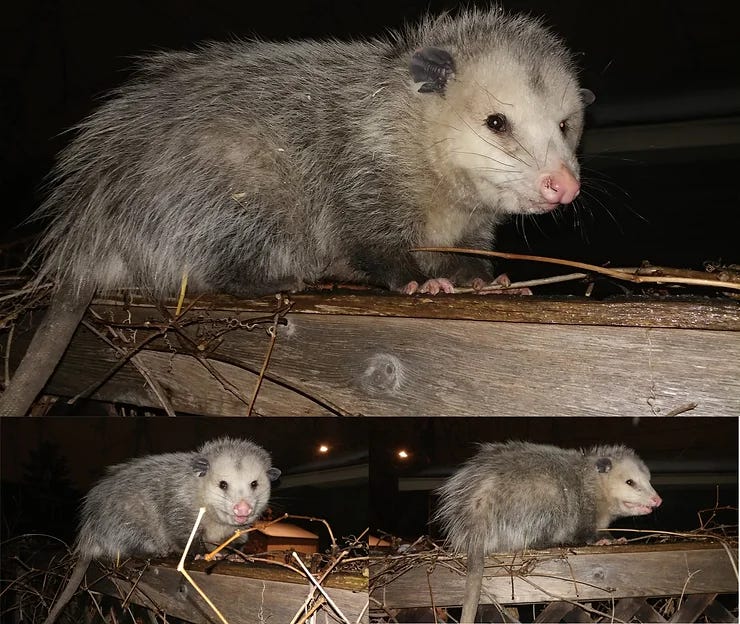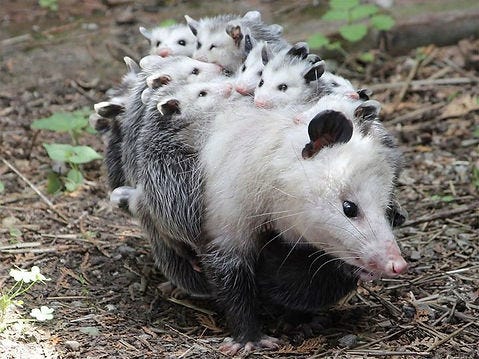The only marsupial found in the USA, the Opossum, is an interesting and relative newcomer to Minnesota. Back when we worked and volunteered at the Wildlife Rehabilitation Clinic we would only rarely see them. The northern-most edge of their range was central Iowa. Occasionally, following a series of warm winters, their population would extend north of the Twin Cities, and we would see a few. But then a cold winter would come and their population would be frozen out, not to be seen again until the next warm stretch.
Since those days, due to climate change, Virginia Opossums (Didelphis virginiana) are now permanent residents here, which we find kind of delightful. For a brief time Mike worked as the Rehabilitation Manager at the HOWL Wildlife Center in Seattle, Washington, and we took in hundreds of Opossums there. We always found them unusually comical animals to be around. They have cute and funny personalities. Their giant, gaping mouths can make them look terrifying, but the fact that they almost never bite causes many wildlife professionals to classify them as harmless. In all of the countless Opossums we have handled we cannot recall one of them ever trying to bite, even when being captured. They will open their mouths and hiss or growl and put on a bit of a show. Or, they will go stiff and play dead ("playing opossum"). Other than getting into your garbage can at night, or eating some fruit or veggies out of the garden, that is about as much trouble as they usually cause, which is not a bad payment for the benefits they provide. (They eat a ton of garden pests and ticks, for example.)
As mid-winter has been settling in here, the neighborhood opossum have been taking a greater interest in our chicken coop. Because they are drawn to the straw we use for insulation and bedding as well as warmth and food that is always available there, we have seen a string of different opossum visitors recently.
Prior to having chickens the opossum would rarely come down into our yard. They were content to remain in the trees, or to walk along the top of the privacy fence to graze on grapes from the grape vines that grow on the fence on the south side of the house. A couple of times we needed to go rescue one the dogs had cornered. That usually was as simple as using a towel and a catch pole to lift them up to the top of the fence to safety. That has changed with the addition of chickens to the yard.
Reputable websites about opossum say they only "rarely" kill adult chickens. It is easy to understand why this is true. Opossum are not predators. They are very slow-moving and relatively defenseless. On the other hand chickens are relatively large, agile and pretty fast.
However, chickens do not see well in the dark and when hunkered down on a perch at night almost anything could walk right up and grab them. And, one thing opossum are very good at it is grabbing and holding onto things. A life of living in trees assures a solid grip. Also: while opossum are most certainly not hunters, they do love meat. It is understandable, therefore, that if the opportunity arose for one to grab hold of a sleeping chicken, they would likely take it. This is likely why credible sources avoid saying that opossum are of no risk to chickens and go out of their way to say they "rarely" kill them and not that they don't kill them.
That is all a long-winded way of saying that the conversation around keeping chickens around opossum is filled with important, and sometimes subtle, nuance and distinctions. Chickens that live 100% of their lives inside predator-proof enclosures are at zero risk from opossum. Ours, on the other hand, sleep inside a predator-proof coop but free-range our whole yard during the day, which would also not likely cause any issue with opossum, which are almost exclusively out and about after dark. A giant old oak tree canopies the yard where where our chickens live. It is ideal opossum habitat.
At our house we extend the chickens' awake hours by providing supplemental lighting in and around the coop in the evening hours. This helps keep their day/night cycles more steady and helps with their molting and egg production. It also creates a period of a couple of hours each evening where the chicken and opossum activity in the yard overlaps. We, therefore, consider the opossum to be of some potential risk to our chickens, though not a huge risk.
As a result of the increased risk to our chickens, due to the way we are keeping them, we recently posted a photo of one of our recent opossum visitors (who I actually caught building a nest right under our chicken coop) and sought input from other chicken keepers about what, if anything, we should do about it.
The post got some helpful conversation going. Among the helpful comments, however, were a shocking number of people screaming (sometimes in all caps with lots of exclamation points) "kill it." This was less surprising than it was saddening.
We've seen the behavior before. Whenever anyone posts questions about potential predators to chickens on these groups, like raccoon, fox or coyote, there is always a chorus of people who will scream, "kill it."
Admittedly, we are not chicken-keeping experts. Our first chickens are not even a year old yet. However, after working with wildlife for a few decades, there are some things we do know, like, for example, the fact that killing opossums that come into our yard will not stop other opossums from coming here. We also know that, as a prey species, opossum mothers regularly produce large litters of offspring.
Prey species, like opossum, produce a lot of offspring as their way of ensuring healthy populations in the face of predation. When one animal is killed, it simply leaves room in the ecosystem for another of the "surplus" offspring to survive. Even if we wanted to kill off the opossums in our yard (which we don't want to do) we would be unlikely to be able to. The number of offspring being produced by the animals in our yard, and our neighbors yards, and their neighbors' yards is pretty significant. Keeping opossum away from our chickens via lethal means, therefore, would require a community-wide extermination effort that would A) not be possible and B) would have profoundly negative consequences on our ecosystem.
People scream "kill it" as a solution to wildlife challenges, therefore, are exposing their ignorance of how nature works.
In the online chicken groups some of people who opposed using lethal means to try to manage our opossum concerns chastised those recommending death and instead recommended "humane" trapping and relocating. While those people no doubt had great intentions, they were equally as ill-informed as those whose knee-jerk reaction was to recommend death. Relocating animals is as ineffective as death. From a population perspective, there is no difference. Furthermore, studies on relocated animals show they have a very poor chance of survival being taken to a strange territory where they do not have food, water or shelter and where they need to compete with the resident population to try to acquire those things. Relocation is, therefore, often less humane than killing outright.
With our opossums we have chosen a different approach: We are teaching them that coming into our yard is not safe. They can stay in the trees and on the fence, but if they venture into the yard, on the ground, we catch them and give them a stern talking to. Then, we place them safely on the privacy fence, let our dogs bark at them for a few minutes and then leave them alone. In short, we are training our opossum to avoid our dogs and chickens and it seems to be working. None of the opossum we have caught have so far re-visited.
Whether or not this will work long-term we do not yet know. One thing we do know for sure is that humans are going to survive on this planet, we need to find ways of living with wildlife rather than giving into the mindbogglingly short-sighted and knee jerk reaction to simply kill anything that comes into our yards.
Opossums are here due to climate change. They are here because of us. We have been ignorantly and aggressively messing with the world around us for way too long. It is long past time to find a new way of coexisting and cooperating.



